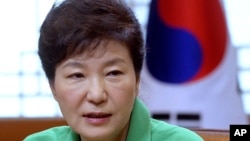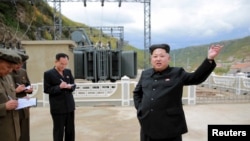South Korea is making intensive diplomatic efforts in response to a possible long-range rocket launch by North Korea, according to officials and experts in Seoul.
The move comes after North Korea made a series of threats that jeopardized an emerging thaw in inter-Korean ties. On Tuesday, North Korea warned of a possible nuclear attack on the United States. The warning followed an earlier threat that it could soon fire a long-range rocket.
South Korea’s presidential office Wednesday said President Park Geun-hye will travel to New York later this month to attend the United Nations General Assembly. Park is scheduled to deliver the keynote speech at the meeting, which some 160 heads of state and government from around the world are expected to attend.
During the trip, Park is expected to engage in a flurry of diplomatic efforts aimed at keeping Pyongyang from conducting a long-range rocket launch or nuclear test.
“Deterring military threats from North Korea through diplomatic efforts is likely to be the main message of her speech,” Kim Yong-hyun, a professor at Dongguk University, told VOA.
Kim said the South Korean leader will send a warning message regarding North Korea.
Seeking international support
This week, South Korea’s Foreign Ministry dispatched key officials handling the North Korean nuclear issue in an apparent attempt to seek international support for its efforts.
Hwang Joon-kook, South Korea’s top nuclear envoy, traveled to New York Monday where he met with envoys from members of the United Nations Security Council to discuss the North Korean threats. Kim Gunn, director-general for North Korean nuclear affairs, traveled to Beijing Tuesday to meet with his counterpart.
Some analysts say there is a growing consensus between Seoul and its allies that Pyongyang’s further aggressions should trigger tougher international sanctions.
Choi Gang, deputy chief of Asan Institute for Policy Studies, a private institute in Seoul, said existing U.N. sanctions have measures that provide a basis for more coercive actions against Pyongyang.
The United States has warned North Korea against provocations, calling on Pyongyang to comply with international obligations.
“We will repeat our call that North Korea should refrain from irresponsible provocations that aggravate regional tensions and should focus instead on fulfilling its international obligations and commitments,” said White House Press Secretary Josh Earnest during a press briefing on Tuesday.
The Pentagon said Washington is in “close contact with” Seoul and it is “committed to the defense” of Seoul.
Jee Abbey Lee contributed to this report, which was produced in collaboration with the VOA's Korean service.





